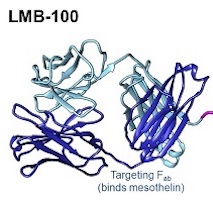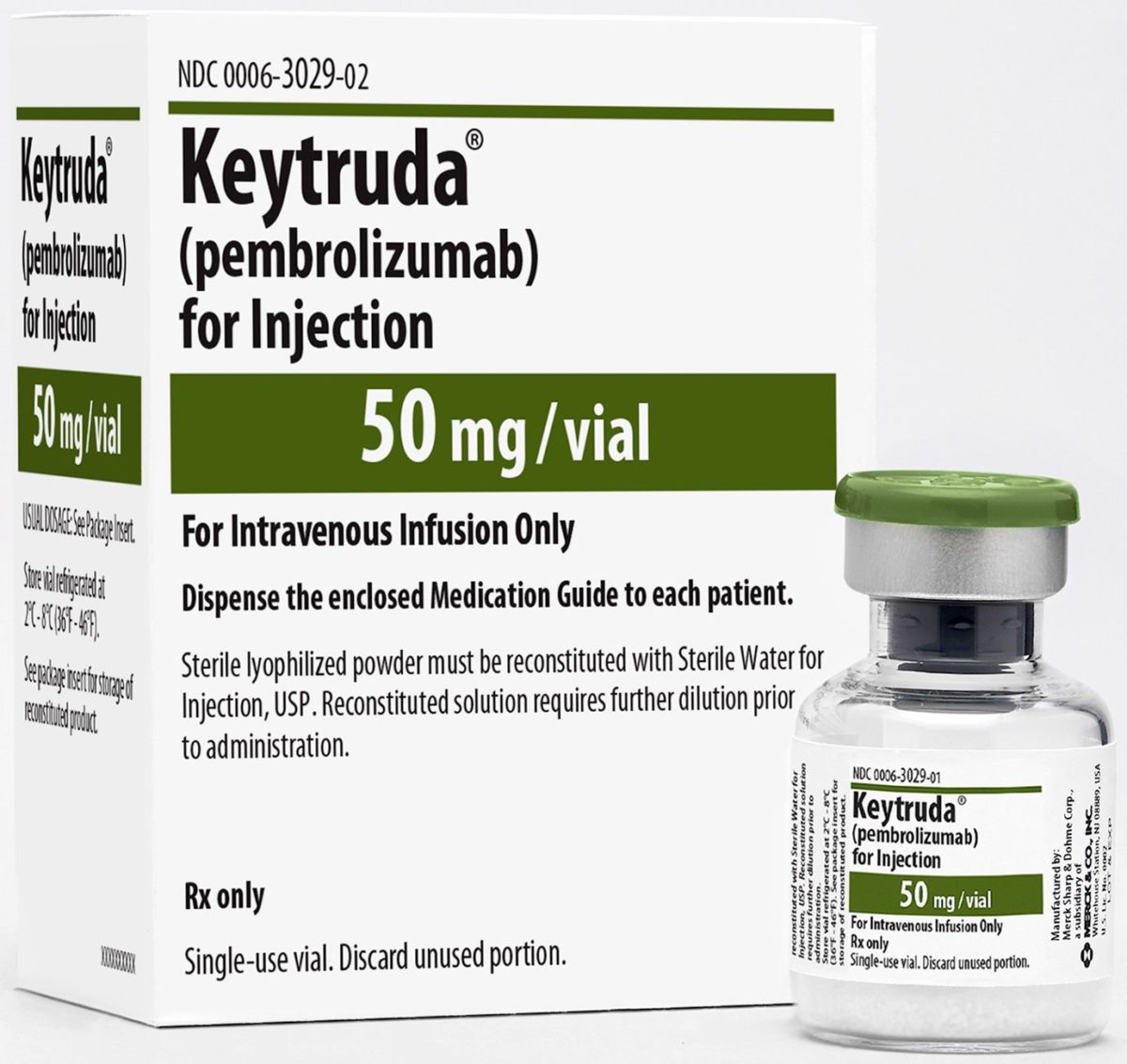Mesothelioma Help Cancer News

New Study Shows LMB-100 Can Be Even More Effective Paired with Keytruda for Mesothelioma Treatment
A new study published by the Science Translational Medicine journal showed that, for a small cohort, LMB-100 could be even more effective when paired with Keytruda for treating patients with mesothelioma. Researchers saw a median survival rate of almost a year, with a handful of clinical trial participants continuing to show progress after more than three years.
Following this success, the National Cancer Institute is currently accepting clinical trial participants for phase 2 of the study.
LMB-100 is an immunotoxin drug designed to help the immune system find and destroy cancer and mesothelioma cells.
Keytruda, an antibody drug used in cancer immunotherapy manufactured by Merck and also known as Pembrolizumab, has been approved by the FDA over the years for several treatments including solid tumor cancers and non-small cell lung cancer.
The study showed that patients taking both LMB-100 and Keytruda (pembrolizumab) could result in more effective treatment.
“In some of the patients, receiving pembrolizumab after LMB-100 resulted in greater efficacy than what would be expected from pembrolizumab alone,” said Raffit Hassan, M.D., Chief of the Thoracic and GI Malignancies Branch at the National Cancer Institute.
Patients diagnosed with malignant mesothelioma are encouraged to speak with their oncologist or consult with a Mesothelioma Center of Excellence to determine whether Keytruda or other medications can be an effective treatment, or whether they might be a candidate for a clinical trial. We at MesotheliomaHelp.org are always available to assist you.

Keytruda Approved by FDA for Further Potential Treatments of Mesothelioma
Keytruda, an antibody drug used in cancer immunotherapy manufactured by Merck and also known as Pembrolizumab, has been approved by the FDA for treatment of solid tumor cancers. Previously, the drug had only been approved to treat non-small cell lung cancer. This is an important development for certain mesothelioma patients.
In a press release, the FDA said that clinical trials showed an effective response rate for 29 percent of patients with mesothelioma and other applicable tumors that displayed high levels of mutation. While there is still no cure for mesothelioma, of those who participated in the trial, half saw a benefit for an additional year, while the other half demonstrated benefit for an additional two years.
The drug works by targeting the cellular pathway of proteins found on the body’s immune cells and some cancer cells. By blocking this pathway, Keytruda may help the body’s immune system fight cancer cells.
The previous FDA approval in 2015 came after a U.S. clinical trial found Keytruda to be effective in controlling mesothelioma tumors in three-fourths of patients, leading researchers to say the results are “encouraging.”
Like lung cancer, pleural mesothelioma is an aggressive cancer that is challenging to treat. Pleural mesothelioma can take decades to display symptoms and can leave patients with life-threatening complications. The asbestos-caused cancer affects the lining of the lungs and often leaves patients with less than 18 months to live after diagnosis.
Patients diagnosed with malignant mesothelioma are encouraged to speak with their oncologist or consult with a Mesothelioma Center of Excellence to determine whether Keytruda can be an effective treatment. We at MesotheliomaHelp.org are always available to assist you.

New Treatment Using Transarterial Chemoperfusion Shows Promise for Mesothelioma Patients

Mesothelioma Centers of Excellence are Open for Patients
We frequently suggest to patients and patient’s families to seek out a Mesothelioma Center of Excellence if diagnosed with this rare disease. For many, this includes traveling to get care at one of these centers. When the pandemic was first at its peak, a lot of travel was suspended and many just did not feel comfortable traveling away from home. For some who live locally to their Mesothelioma Center of Excellence they were able to have treatment but that was not the case for everyone.
Each state has lifted some restrictions that were incorporated during the crisis of the pandemic, and the Mesothelioma Centers of Excellence are open. Many physicians have adapted to telehealth visits to accommodate patients during the pandemic. Thankfully, we are a world of technology and many test results, scans, and lab values can be expedited from your hometown medical center to an expert of mesothelioma, allowing a lot of preliminary work to be done prior to your arrival.
If you are traveling to a Mesothelioma Center of Excellence, we have some suggestions:
- Inquire about their protocols for arrival of appointments. Do you need to call and announce your arrival prior to coming into the office?
- Can a family member or friend accompany for the visit? If not, can you call in and be placed on speaker phone while the consult is active with physician and patient?
- Are you required to bring hard copies of scans, reports, etc.?
- Will your visit require an overnight stay at local hospital? If so, can they help with accommodations?
- Asking what you should expect during this visit. The Mesothelioma Center consists of many medical professionals. Will you meet them in person?
These are a few suggestions to make your visit more streamlined. We urge you to get to a Mesothelioma Center of Excellence as soon as possible, as this is a very aggressive disease. The medical professionals realize this is a difficult situation coupled with the world’s current situation. We want you to know the centers are here for you.
There have also been many volunteer opportunities that continue to be available to help you facilitate your treatment for your mesothelioma. For example, Angel Flights has been successful in transporting patients for treatments and returning them home. Please reach out to us or a Mesothelioma Center so we can assist you with making the connections that can help you with your disease.

Coronavirus & Mesothelioma Treatment: One Patient’s Story
The COVID-19 pandemic upended our usual routine and impacted all of our lives. For people that needed medical treatment it became a different experience. Having treatment for anything but coronavirus related illness became the exception. No visitors were allowed in the hospitals for patients no matter what their diagnosis. Many people put off necessary treatment for a later time. Facing cancer at any time is frightening. Facing treatment for a rare cancer such as malignant mesothelioma, alone without your loved ones, can add another layer of stress.
Reading and hearing about people’s experiences you think would prepare you for seeing it in person. Whether it is physical or psychological the suffering is real.
Our patient was a middle aged man who has malignant pleural mesothelioma. His presenting symptom was a cough that would not go away. He was worked up for it and he was a surgical candidate which he opted to have. The time between his symptoms and being diagnosed was a few months. Things were on track for surgery, and he lived locally near his Mesothelioma Center. Things were lining up for him in a timely fashion, but then the pandemic came and things changed.
It is known that patients facing a cancer diagnosis do better with family support. Since most cancer treatment is on an outpatient basis that is where the majority of support happens. However, the period in the hospital is unfamiliar and frightening – it can be terrifying. Our patient was dropped at the hospital and stayed in for greater than 30 days. He had a support system, but no visitors were allowed into the hospital. For his inpatient stay he remembers being confused, afraid, and convinced that he was dying. During this month-long stay he praised the staff of the hospital, but explained that not to see your loved ones when you are confused was too much. Frequent phone calls were no substitute for seeing someone who is supporting you through this stressful time. His hospital course was complicated and since discharge he has been experiencing many different emotions. Usually someone in control of his emotions, he finds himself crying frequently and unexpectedly. As he is processing this trauma he and his loved ones are realizing what an important part that support plays in a person’s physical and psychological recovery.
Treatment for mesothelioma is difficult under the best of circumstances but during the pandemic it became harder. As people start to come for specialized treatment to a Mesothelioma Center of Excellence please know that their team is very tuned in to how vital support from their loved ones is during this time.
Free Mesothelioma Patient & Treatment Guide
We’d like to offer you our in-depth guide, “A Patient’s Guide to Mesothelioma,” absolutely free of charge.
It contains a wealth of information and resources to help you better understand the condition, choose (and afford) appropriate treatment, and exercise your legal right to compensation.
Download Now